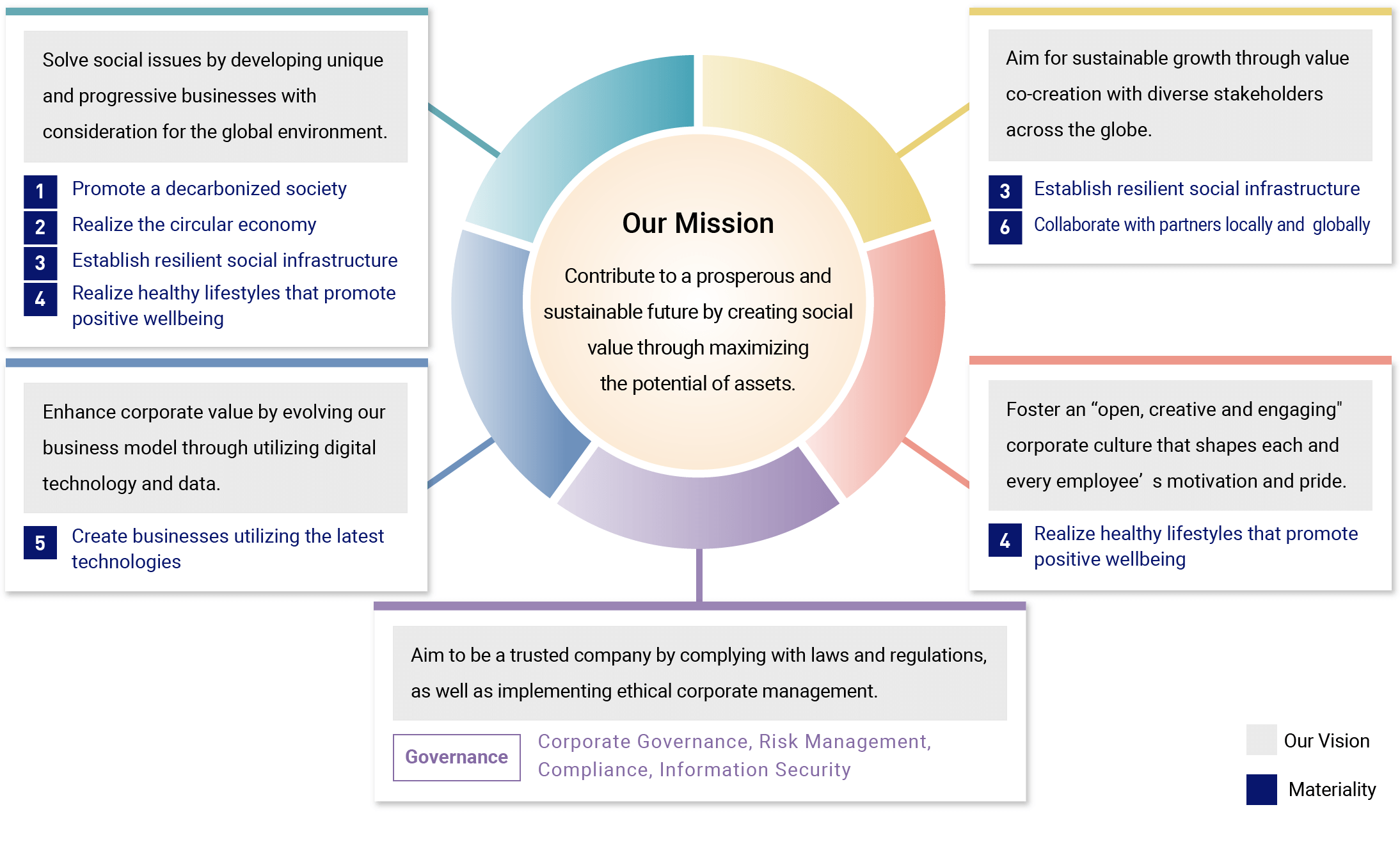Materiality (Priority Key Challenges)
Mitsubishi HC Capital Inc. identified the following six materiality as priority key challenges which must be addressed to achieve sustainable development of Mitsubishi HC Capital Group.
Against a backdrop of megatrends such as recent climate change driven by global warming, population growth, urbanization and scarcity of resources, not only our personal life but also social environment have been drastically changing worldwide. Under such circumstances, companies are expected to take efforts to solve numerous issues, such as to promote a decarbonized society and to create a circular economy. The Group will proceed its effective management and business activities toward solving such issues based on the materiality with appreciating the significance.
Materiality of the Group
| Materiality | Why the Group treats as highly material challenges | How related to SDGs* |
|---|---|---|
Promote a decarbonized society |
Efforts to realize a decarbonized society have been globally recognized as an urgent issue and the Group can significantly contribute to solving this challenge through its service and solutions, such as renewable energy investment and EV promotion. It is quite a few impact on but is significant for the Group to distinct its business from the business not solving social issues. |
  |
Realize the circular economy |
The Group aims to contribute to creating a circular economy by reducing waste, not only in the Group but also within society through maximizing the potential of assets as a leading leader in the leasing industry. The Group treats this challenge as material. The Group can also contribute to realizing a sustainable and prosperous society through strengthening the collaboration between partners. |
    |
Establish resilient social infrastructure |
Large parts of the infrastructure within Japan needs to be repaired. The Group also recognizes the business has huge potential opportunities to support the development of infrastructure in overseas countries with active collaboration between various partners and create a smart city. The Group will contribute to the business being diversified, enhanced and efficient through establishing the system and providing services for supporting the collaboration of various companies. |
  |
Realize healthy lifestyles that promote positive wellbeing |
It is vital for its stakeholders that the Group recognizes the importance of health, safety, mental and physical wellbeing for realizing the prosperous future. Valuable human resources are key. Personal development and attraction and retention of talent is significant for the Group members. |
   |
Create businesses utilizing the latest technologies |
Both financing for the purpose of digital transformation of customers and providing solution by internal and external digital technologies urge to develop new business models. Including establishing supply chain with utilizing with new alternative energies, the Group identifies material one as the opportunity. |   |
Collaborate with partners locally and globally |
Social issues differ by countries and regions. It is significant that the Group aims to solve these issues by collaborating with local partners to ensure the Group is meeting individual needs through local community-based communication. The Group can realize mutual benefits in developing society by utilizing the integrated capability in the Group. |
  |
- SDGs: Sustainable Development Goals
About Basic Sustainability Policy
We have established connections with many stakeholders globally and have great potential to contribute to the resolution of social issues. With this potential, we have established Our Mission as our aspiration to create social value together with our customers and partners and contribute to a sustainable and prosperous future, and Our Vision as what we should aim for in order to realize this aspiration. This integrated stance of Our Mission, Our Vision, and the identified material issues is what makes the Basic Sustainability Policy of the Group.
How Materiality Relate to "Our Mission" and "Our Vision"

How the Company Identified the Materiality
- Identified internal ESG priority key challenges
The Company first listed wide-ranging ESG-related challenges based on related international guidelines and principles such as the ISO 26000 standards, SDGs (Sustainable Development Goals), and others.
Subsequently, the Company conducted employee questionnaires and interviews throughout the Group and ascertained potential challenges in consideration of their importance for the Group as both opportunities and risks. - Identified ESG priority key challenges for external stakeholders
Via interviews with stakeholders including major customers, shareholders, and partners, the Company confirmed and listed key ESG material issues from the perspective of the stakeholders based on their professional expertise and opinions. - Management held discussions and made decisions
By reviewing how the priority key challenges relate to our Mission, our Vision and SDGs, the Company identified the key challenges that the Group must address through discussions with relevant departments, the Sustainability Committee, the Executive Committee, and the Board of Directors.
How Materiality was Identified (Visualization)

